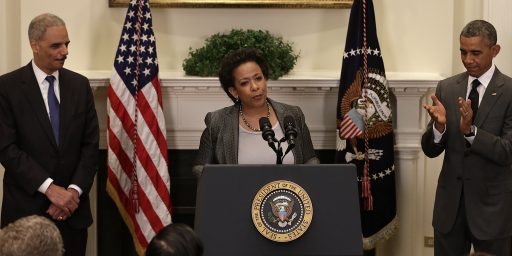Egypt’s “Stupid” Transition
Sequencing matters.
 As Doug Mataconis noted yesterday, and as the BBC reported: Egypt supreme court calls for parliament to be dissolved
As Doug Mataconis noted yesterday, and as the BBC reported: Egypt supreme court calls for parliament to be dissolved
Two days before Egyptians choose a new president, it has declared last year’s parliamentary vote unconstitutional.
[…]
The court had been considering the validity of last year’s parliamentary election, because some of the seats were contested on a proportional list system, with others on the first-past-the-post system.
It decided that the election law had allowed parties to compete for the one third of seats reserved for independent candidates.
The head of the supreme court Farouk Soltan told Reuters: “The ruling regarding parliament includes the dissolution of the lower house of parliament in its entirety because the law upon which the elections were held is contrary to rules of the constitution.”
Many of the seats ruled unconstitutional were won by the Muslim Brotherhood.
The court also ruled:
In a separate ruling, the supreme court also decided that former Prime Minister Ahmed Shafiq could continue to run for president in the June 16-17 presidential run-off election, rejecting as unconstitutional a law that would have barred him from standing.
Under the Political Exclusion Law, passed by parliament, senior officials from former President Hosni Mubarak’s regime were banned from standing for office.
Marc Lynch weighs in:
[The] moves by the Constitutional Court on behalf of the ruling Supreme Council of the Armed Forces (SCAF) seem difficult to overcome and likely to push Egypt onto a dangerous new path. With Egypt looking ahead to no parliament, no constitution, and a deeply divisive new president, it’s fair to say the experiment in military-led transition has come to its disappointing end.
This is a highly problematic situation, to put it mildly and it all starts with a primary error from the get-go in this process: the lack of a permanent constitution. The choice made by the military government to go to a temporary constitution and then to parliamentary and presidential elections meant starting the game without rules in place. Sequencing matters in these situations. Of course as Matthew Shugart pointed out in May, there have been some odd choices (warning: understatement) in the Egyptian transition:
It would seem that one would not want to wait until the week of a presidential election-or worse still, between rounds of said election-to define the powers of the president-to-be.
Indeed.
The more appropriate route for the transition would have been the calling of constituent assembly to write a new constitution that would have established the rule of the game going forward. Instead, the existing constitution was altered and then a quick move was made to first parliamentary and now presidential elections. These processes, which are essential for the establishment of a viable new governing system, were clearly not well thought out. The first round of the presidential election was a bit of a mess, and has led to one of the candidate being highly controversial and now the election of one-third of the parliament has been declared unconstitutional.
I would note, as I did at the time (and then here and here), the military remains the key institution and is the one in charge. Although, as Lynch notes in his post, the degree to which the military has some master plan is highly questionable as none of this looks especially well planned, to put it mildly.
(The post title is a reference to another a quote cited by Lynch from Nathan Brown).



![Military Coup Underway In Egypt [Update: Morsi Deposed]](https://otb.cachefly.net/wp-content/uploads/2011/02/egypt-flag3-512x256.gif)


Ideally, this would have been the way things to unfold.
Realistically, nothing that happened in Egypt was going to happen without the consent, and under the control of, the military.
@Doug Mataconis: Indeed. But as Lynch notes, I don’t think that what we are seeing is a master plan by the military. It was in their interest to have an ordely transition and they appear to have blown it.
Oh I’m not sure they had a plan either other than “maintain order” and “maintain our position at the pinnacle of power.” But at least they had something. The protesters, as a I noted in my post this morning, are coming to realize that they should’ve had a plan of their own.
@Doug Mataconis: I don’t see the current developments as surprising. Egypt has no institutions or poltitical assemblies other than the Brotherhood with the organizational capacity to step into the void, and no tradition of civil liberty and governmental restraint. One could look at this as Chapter 3 of the country post- Mubarak, an additional step to wherever the process is taking Egypt. If there was a failure on the part of revolutionaries, I would guess it lay in thinking the job was done and the country firmly on their preferred path.
Revolutions seldom are well-planned.
In this case I suspect the military had reason to hope this process would go in their favor. The protesters welcomed the Army in the square. They had apparently hoped tossing Mubarak under the bus would placate the crowd and they could then proceed with business as usual, under slightly different management, perhaps. Expect them to propose a constitution that would include a possibility of their removal from power? I think that hoping for much too much.
@Ben Wolf:
To some extent the revolutionaries made a mistake in making their goal the removal of Mubarak and his family only, because that left in place the rest of the power structure that he controlled.
Of course, the real folly of the Egyptian revolutionaries is that since all other countries in the history of the world where governments have been toppled have settled matters satisfactorily in a matter of a few weeks, they needed to have come to the table with a complete plan for converting to a new system. If only they’d listened to us…